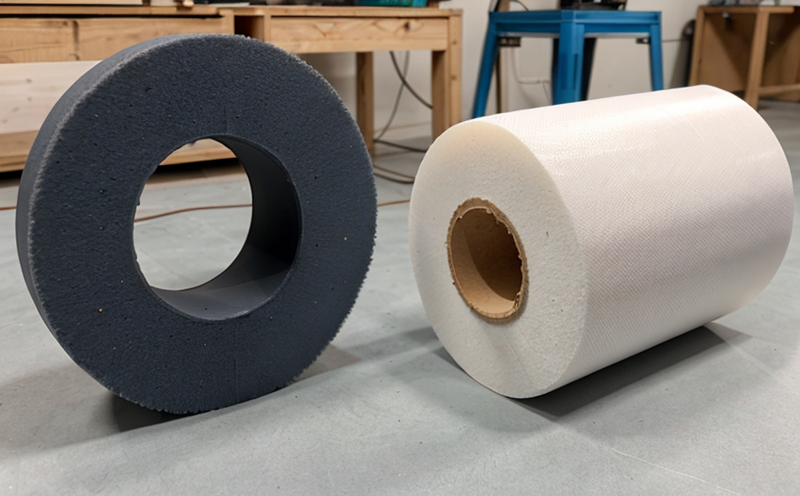ASTM D790 Flexural Strength Testing of Plastic Furniture Materials
The ASTM D790 Flexural Strength Test is a critical procedure used to evaluate the resistance of plastic furniture materials under bending stress. This test is particularly important for ensuring that furniture components meet safety and durability standards, especially in high-use environments like commercial offices, schools, and public spaces.
The ASTM D790 standard provides detailed guidance on how to perform flexural strength tests using three-point or four-point loading methods. The focus of this testing is on the mechanical performance of materials under bending stress, which can indicate their suitability for furniture components that are subject to repeated loads over time.
For plastic furniture manufacturers and suppliers, ASTM D790 testing helps them ensure compliance with international standards such as ISO 14526. This standard sets out specific requirements for the mechanical properties of plastic materials used in furniture applications. By adhering to these standards, companies can demonstrate their commitment to quality and safety, which is essential for maintaining a positive reputation.
The test involves preparing specimens according to ASTM D790 specifications. These specimens are then subjected to bending stress until they fracture. The maximum load at failure divided by the original cross-sectional area of the specimen yields the flexural strength value.
Understanding the results from this test is crucial for quality managers and compliance officers within furniture manufacturing companies. It allows them to make informed decisions about material selection, process improvements, and product design. For R&D engineers, this testing provides insights into how different raw materials or processing techniques affect the mechanical properties of plastic furniture components.
ASTM D790 is also valuable for procurement teams who need to verify that suppliers are delivering high-quality materials consistent with industry standards. By leveraging ASTM D790 data during supplier audits and material acceptance, companies can ensure they receive reliable materials capable of performing well in real-world conditions.
In summary, the ASTM D790 Flexural Strength Test is an essential tool for furniture manufacturers and suppliers aiming to produce safe, durable, and compliant products. Through rigorous testing, these organizations can maintain high standards throughout their supply chains and product lifecycles.
Applied Standards
| Standard Code | Description |
|---|---|
| ASTM D790 | Standard Test Method for Flexural Properties of Unreinforced and Reinforced Plastics and Polymer Materials. |
| ISO 14526 | Plastics — Determination of flexural properties. |
Scope and Methodology
The scope of the ASTM D790 Flexural Strength Test encompasses various plastic materials commonly used in furniture manufacturing, including polypropylene (PP), polystyrene (PS), ABS, PVC, and more. The test aims to determine the flexural strength and modulus of elasticity of these materials under specific conditions.
Specimens are typically cut from bulk material according to ASTM D790 guidelines. Depending on the type of plastic being tested, the specimens may be flat or have a rectangular cross-section. For three-point loading tests, two supports hold the specimen while a third point applies bending stress until failure occurs. In four-point loading setups, additional support points are used to reduce edge effects.
The apparatus required for ASTM D790 testing includes a universal testing machine capable of applying precise loads and measuring displacement accurately. Other necessary equipment comprises grips for holding specimens securely during the test, a digital load cell to measure applied forces, and strain gauges if modulus of elasticity data is also desired.
During the test, specimens are loaded at a controlled rate until they fracture. Careful measurement of both the maximum load reached before failure and any deflection observed helps calculate flexural strength and modulus values. These measurements provide valuable insights into material behavior under bending stress.
Acceptance criteria for passing ASTM D790 tests vary depending on the specific plastic type, intended use, and design requirements of the furniture piece being evaluated. Generally speaking, materials must meet or exceed specified minimum flexural strength limits set forth by relevant standards like ISO 14526.
Customer Impact and Satisfaction
- Improved Product Quality: By ensuring that all plastic furniture components pass rigorous ASTM D790 tests, manufacturers can enhance the overall quality of their products. This leads to more durable and safer furniture items.
- Enhanced Safety Standards: Meeting ASTM D790 requirements demonstrates a company's commitment to producing safe products free from potential hazards due to material failures under bending stress.
- Informed Decision-Making: Results from ASTM D790 tests provide valuable data that can guide procurement decisions and R&D efforts aimed at improving materials or processes.
- Industry Recognition: Compliance with ASTM D790 standards enhances a company's reputation within the industry, making it more attractive to customers seeking reliable furniture solutions.





